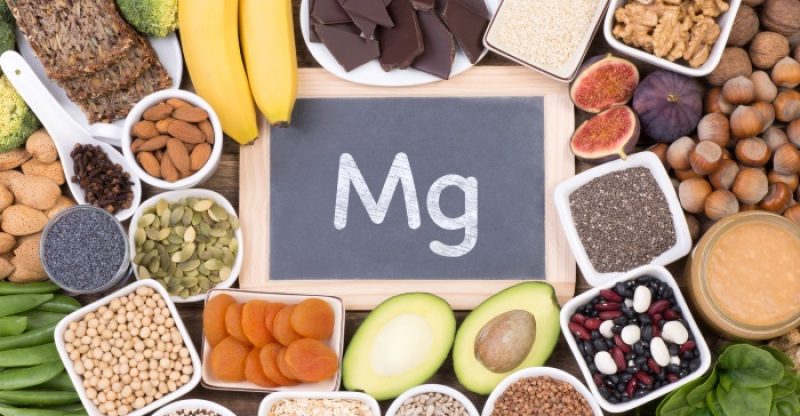11 Evidence-Based Benefits of Magnesium Supplements
Why Magnesium Supplements?
Magnesium plays an important role in multiple bodily functions.
Unfortunately, many of us are deficient in this essential nutrient, with some estimates stating that as many of eight out of ten people lack sufficient magnesium.
In addition to eating more foods rich in magnesium, you may also want to consider taking a magnesium supplement.
Our guide helps you understand why magnesium is so important to your health, and how taking a magnesium supplement can help you be healthier.
Counteracting a magnesium deficiency is an important step you can make starting today to improve your overall health.
What is Magnesium Deficiency?
Magnesium deficiency, which is also known as hypomagnesemia, can cause many noticeable symptoms, as well as contribute to other health problems.
Because magnesium levels are rarely tested, and this health problem is often overlooked, you may be able to contribute to your improved health just by taking a magnesium supplement.
Symptoms of magnesium deficiency include muscle aches, trouble sleeping, anxiety, and digestive issues.
While we do not need a great deal of magnesium in our bodies to be healthy, without the proper amount, you can start to notice adverse symptoms quickly.
This mineral is vital to many crucial functions, and without it, your health can suffer.
Magnesium is involved in everything from regulating your heart rate to promoting the proper function of neurotransmitters, so maintaining healthy levels is essential.
Results of Magnesium Deficiency
Because magnesium is so critical for many vital bodily functions, magnesium deficiency can cause many different problems.
The most concerning include (1):
- High blood pressure, or hypertension;
- Cardiovascular disease;
- Damage to your kidneys or liver;
- Migraines;
- The cellular damage that can lead to diseases like Alzheimer’s, glaucoma, and multiple sclerosis;
- Other nutrient deficiencies, such as potassium, calcium, and Vitamins B1 and K;
- Insomnia and other sleep disorders, including restless legs syndrome;
- Moodiness and other behavioral changes;
- Increased symptoms of PMS;
- Osteoporosis;
- Immune system suppression, which can lead to recurrent infections;
- Cavities in your teeth;
- Muscle cramps or weakness;
- Problems with pregnancy, such as preeclampsia;
- Impotence.
There are several factors contributing to the increased incidence of magnesium deficiency in the US and other countries.
First is lowered levels of magnesium in the soil, which decreases the amount available in crop foods.
Second, the increased rate of digestive disorders that contribute to malabsorption of minerals, such as magnesium.
The third is an increase in the use of antibiotics and prescription medications that affect our ability to absorb magnesium from the foods we eat.
Our bodies use magnesium every day during normal activities, such as hormone production, our hearts beating, and using our muscles.
Because we are continually depleting our small but vital stores of this mineral, we must also always be replenishing it.
Magnesium supplements and magnesium-rich foods are the only way to ensure we have the proper amount of magnesium in our body’s stores to carry out these everyday functions.
Magnesium is an essential electrolyte our body needs.
While we need less of this electrolyte than others, without it, our entire body is affected.
From energy production to enzyme function, from metabolism to balancing body fluids, magnesium is a critical component of our health.
Over 300 enzyme reactions in your body require magnesium.
Without magnesium, you could not synthesize or reproduce RNA or DNA.
Magnesium is essential for controlling blood pressure, muscular contractions, metabolizing insulin, regulating cardiac activity, and sending neural transmissions.
Magnesium plays a significant role in the prevention and treatment of several diseases, and deficiency in this mineral is associated with chronic conditions like Alzheimer’s disease, migraine headaches, insulin resistance, type-2 diabetes, attention deficit hyperactivity disorder (ADHD), hypertension, and cardiovascular diseases like stroke (2).
It can be difficult to know if you need a magnesium supplement.
Magnesium is stored in the cells or inside your bones, not in your blood, so blood tests can provide inaccurate information about your level of magnesium deficiency (3).
While current options for testing magnesium include serum blood tests and urine and saliva tests, none of these provides an accurate or comprehensive understanding of your magnesium levels (4).
There is little risk of taking magnesium supplements, either for side effects or toxicity.
Therefore, taking a magnesium supplement can help ensure you are getting enough with little concern for adverse effects.
Magnesium Supplements
You can ingest magnesium through the foods you eat in both natural and synthetic form, and it is also available as a dietary supplement.
Some over-the-counter medications also include magnesium, as it enhances the rate of absorption for some medicines.
Supplementary magnesium comes in many different forms, and each is absorbed differently by your digestive system.
Some forms, usually those that are more soluble, are absorbed more easily than others.
In general, magnesium supplements that are in citrate, chloride, or chelate form are easier for your body to absorb than oxide or sulfate supplements.
Here are the basics of each type of magnesium supplement available today.
- Magnesium glycinate is a highly-absorbable form of this important mineral and is commonly used in supplements. This form has fewer laxative effects than other forms. If you have a known magnesium deficiency, this is a good option.
- Magnesium citrate is magnesium and citric acid combined. This type of supplement is most often used to treat digestive problems, such as preventing constipation.
- Magnesium chelate appears in natural foods and is highly absorbable by your digestive system. Chelate binds to proteins, or amino acids, and eating magnesium-rich foods will restore your levels.
- Magnesium chloride is available as an oil that is usually applied to the skin. Magnesium chloride is used by those who have difficulty absorbing magnesium through digestion. It can also be used on the skin to reduce pain, promote healing of skin and wounds, and to provide increased endurance for athletes.
- Magnesium orotate contains orotic acid, which is beneficial to the heart.
- Magnesium threonate is easily absorbed, and also penetrates into cell mitochondria. This form is not as commonly found as others, but as research continues, you may see this type of supplement available more.
How Much Magnesium Do I Need?
The National Institutes of Health has posted the following recommended daily allowances (RDA) of magnesium for various ages and genders.
- Infants under 6 months need 30 milligrams per day.
- Toddlers ages seven to twelve months need 75 milligrams per day.
- Children ages 1-3 years need 80 milligrams per day.
- Children ages 4-8 need 130 milligrams per day.
- Children ages 9-13 need 240 milligrams per day.
- Adolescents ages 14-18 need 410 milligrams per day for males and 360 milligrams per day for females.
- Adults ages 19-30 need 400 milligrams per day for males and 310 milligrams per day for females.
- Adults 31 and older need 420 milligrams per day for males and 320 milligrams per day for females.
- Pregnant women need between 350-360 milligrams per day.
- Women who are breastfeeding need between 310-320 milligrams per day.
Your level of magnesium is also affected by your levels of other nutrients and can have an effect on your ability to absorb and store other minerals.
If you take a calcium supplement daily, taking a magnesium supplement can help counterbalance those high levels of calcium.
If you take Vitamin D, this can contribute to your magnesium level, as well.
And being deficient in Vitamin K can contribute to your magnesium deficiency.
So, pay attention to all your mineral intake to ensure general healthy functioning.
You want to ensure you are not taking too much magnesium, as this can affect your body’s other mineral stores and ability to absorb certain nutrients.
Never consume doses of supplements that are higher than the recommended daily dosage.
Getting your nutrients from food sources is the safest way to ensure you do not overdose or suffer from toxicity.
Taking supplements can certainly help those with serious deficiencies, and these should be used for specific periods to raise your levels.
Eating nutrient-rich foods will always be the healthier, safer choice when it comes to getting the proper amounts of the minerals and vitamins you need for health.
Benefits of Magnesium
Magnesium helps regulate many of your body’s functions, so you will notice many benefits when you take magnesium supplements or get enough magnesium in your daily diet.
Increases Energy
Magnesium activates adenosine triphosphate, or ATP, in your body, which creates energy.
If you have fatigue, this may be caused by a magnesium deficiency, as your body is not able to produce energy correctly.
Magnesium deficiency can make it difficult to have the stamina and energy needed for exercise, as well.
You will tire more quickly, your heart rate will be higher, and you will require more oxygen if you are deficient in this important mineral (5).
Helps You Sleep Better
Whether you need to quiet your racing thoughts or relax your muscles, magnesium supplements can help you get a better night’s sleep.
Those who take magnesium supplements show improvement in their ability to fall asleep faster and stay asleep longer.
Magnesium is linked to increased levels of melatonin, which induces sleepiness, as well as decreased levels of cortisol, the stress hormone (6).
All of these mean your sleep will improve.
Calms and Controls Muscles
Because of magnesium’s role in muscle contractions and neuromuscular transmissions, magnesium deficiency can cause muscle aches and spasms (7).
Magnesium deficiency can not only result in muscle spasms, like leg cramps, but also in the irregularity of smooth muscles like those found in your heart.
Taking a magnesium supplement can help if you have regular muscle cramps, pain, weakness, or contractions.
Relieves Constipation
Magnesium also plays a role in the muscles of your digestive tract, which can affect your comfort when going to the bathroom.
Without proper muscle contractions in your intestines, you can easily become constipated or have other digestive problems.
For this reason, magnesium supplements can be taken to help prevent constipation, as it assists in relaxing the intestinal muscles so they can adequately rid your body of the waste from digestion.
Research indicates that many who suffer from regular constipation are also deficient in magnesium (8).
Magnesium supplements should not cause diarrhea or other problems.
If they do, you are likely taking too high of a dose.
Regular use of magnesium supplements will help keep you regular, but should not be used as a laxative.
Can Reduce Anxiety
Your body naturally produces serotonin and other hormones that help you feel happier or boost your mood.
Neurotransmitters like gamma-aminobutyric acid, or GABA, are needed to control this production, and magnesium plays a vital role in GABA function.
Because magnesium promotes the regulation of all your hormones, including those that encourage relaxation and positive mood, magnesium deficiency can lead to increased anxiety or other mood disorders.
In animal trials, magnesium has been shown to decrease anxiety-related behaviors and reduce the production of cortisol, or the stress hormone.
When magnesium deficiencies are addressed in these trials, anxious behaviors are reduced, and cortisol levels lower (9).
Regulates Other Nutrients
Magnesium is necessary for the proper function of other minerals and vitamins in your body.
Magnesium helps transport potassium and calcium ions through cell membranes, which is why it plays such a vital role in healthy heart rates and muscle contractions.
Magnesium helps calcium do its job in bone development, too.
Prevents Migraines
Migraines can be triggered or made worse by a number of factors.
Magnesium works to lessen your migraine symptoms or prevent migraine headaches altogether, in two ways.
First, magnesium controls the release of pain-reducing hormones, so having enough magnesium means your pain will not get out of control, should a migraine strike.
Second, magnesium reduces the constriction of blood vessels that raise blood pressure, which can contribute to migraine pain.
When those with chronic migraines take magnesium supplements, their symptoms improve (10).
Improves Heart Health
Your body has a higher concentration of magnesium in the heart than in any other area.
In conjunction with calcium, magnesium regulates your blood pressure to prevent hypertension.
It also controls your heart rate.
The ratio of magnesium to calcium can even play a role in severe muscle spasms that lead to a heart attack.
Helps Prevent Osteoporosis
Magnesium supports bone formation and density.
Because it works collaboratively with nutrients like calcium and Vitamin D, which both play a substantial role in bone health, magnesium can help prevent osteoporosis.
These minerals are all necessary for optimal bone density for both women and men.
Helps Prevent Diabetes
Having enough magnesium means you are also protecting yourself against many other medical problems and chronic diseases.
You can help prevent diabetes and insulin resistance with proper levels of magnesium in your body.
Magnesium increases your cells’ sensitivity to insulin, which means you need to produce less to achieve the same results (11).
This creates less glucose in your blood, as well.
Managing diabetes through magnesium supplementation can be a safe, natural way to support your better health.
Other Benefits
- Magnesium has long been used by doctors to treat eclampsia, as a preventative treatment for those at risk for eclampsia, and in patients with severe pre-eclampsia. Magnesium’s effect on blood pressure and cardiac rhythms, as well as its other effects, are essential for treating this condition in pregnant women (12).
- Because magnesium can promote bronchial dilation and act as an anti-inflammatory, it has also been used to treat asthma, especially in young children (13).
How to Get Magnesium through Diet
Magnesium is found in many foods that are a part of a healthy, whole-foods diet.
Nearly all foods that contain natural, dietary fiber also contain magnesium.
Magnesium is also added to some foods, like cereals, but this form is often found in highly-processed foods.
The top sources of natural magnesium are spinach (157 mg), Swiss chard (150 mg), black beans (120 mg), mung beans (97 mg), almonds (97 mg), cashews (28 mg), and potatoes (26 mg).
These all contain at least one-quarter of the recommended daily allowance for magnesium.
Below are some other magnesium-rich foods that have additional health benefits.
- Leafy Greens
Many leafy greens are loaded with magnesium, and these top the magnesium-rich foods chart.
Spinach, kale, turnip greens, collards, and mustard greens are all excellent sources of magnesium.
You will get other essential nutrients from leafy greens, including iron, manganese, and Vitamins A, C, and K.
And you will benefit from lots of dietary fiber.
- Dark Chocolate
In addition to being delicious, dark chocolate is also an excellent source of magnesium.
And it has iron, copper, manganese, and beneficial antioxidants, which can boost your immune system.
- Legumes
Legumes like chickpeas, peas, soybeans, lentils, and other beans are excellent sources of magnesium.
Most legumes also contain potassium and iron, and they are a great source of protein and fiber (14).
- Avocados
With loads of nutrients and a source of healthy fats, avocados are a good choice as a source of dietary magnesium.
One avocado provides 15% of your daily magnesium intake (15).
You will also get potassium, Vitamin K, and B-vitamins from this fruit.
And avocados are an excellent source of fiber.
- Nuts
Many nuts are a great source of magnesium, and most contain a good amount of fiber and healthy fats.
They are also an excellent source of plant-based protein.
Topping the charts for magnesium are almonds, cashews, and Brazil nuts.
And Brazil nuts contain selenium, which is another essential mineral for your body.
- Seeds
Seeds are a great source of magnesium, with pumpkin, chia, and flax leading this category.
Most seeds contain high amounts of iron, as well as heart-healthy omega-3 fatty acids.
They contain fiber, protein, and antioxidants, making them a great snack or part of any meal.
- Whole Grains
Whole grains that have not been overly processed are good sources of magnesium.
Wheat, barley, oats, buckwheat, and quinoa are all excellent whole grains.
You will also get other important nutrients, like manganese, selenium, and B vitamins from whole grains, plus the dietary fiber you need.
Buckwheat and quinoa are also high in protein, which makes them great choices for vegetarians and others looking for plant-based sources thereof.
- Bananas
While you may consider bananas to be healthy due to their potassium content, they are also an excellent source of magnesium.
One banana can provide you with nearly 10% of your recommended daily allowance.
Bananas also contain fiber, manganese, Vitamin B-6, and Vitamin C (16).
- Tofu
Not only is tofu an excellent plant-based source of protein, but it is also rich in magnesium.
Because it is made from soybeans, which naturally contain magnesium, tofu is a great addition to your diet.
Tofu also contains high amounts of iron, calcium, manganese, and selenium.
- Sea Vegetables
Sea vegetables such as kelp, nori, and dulse are excellent sources of magnesium.
These plants are rich in chlorophyll, too, which boosts nervous system function.
And sea vegetables are rich sources of antioxidants, which promote immune system health.
- Figs
This dried fruit is a significant source of magnesium, as well as dietary fiber and other nutrients.
Figs, along with other dried fruits like prunes, raisins, apricots, and dates, are packed with vitamins, minerals, and antioxidants.
- Non-Plant Sources
Many oily fishes, like mackerel and sardines, are rich in magnesium, as are grass-fed dairy products.
Magnesium Supplement Concerns
It is nearly impossible to get too much magnesium simply from eating magnesium-rich foods.
When your body has an excess of this important nutrient, your kidneys simply flush it out with your urine.
If you are taking magnesium supplements, though, there is a greater chance you may take too much, but toxicity is very rare.
Instead, you may experience a laxative effect if you ingest too much magnesium through supplements.
If you notice diarrhea, nausea, or abdominal cramps while taking magnesium supplements, stop taking them.
Some supplements contain additional ingredients that can cause digestive problems, and these are most common in doses over 600 milligrams.
Always take the recommended dosage of any supplement.
Magnesium supplements are effective if you take no more than 400 milligrams per day.
Precautions
If you are deficient in the essential nutrient magnesium, you are not alone.
It is common for many who consume a Western or SAD diet to be low in magnesium.
If you are not getting the magnesium you need from the foods you eat, consider taking a magnesium supplement.
While you do not need a lot of magnesium to be healthy, you do need the proper amount, or you will likely experience many issues.
Magnesium is responsible for or assists in hundreds of bodily functions.
Symptoms of magnesium deficiency include muscle spasms, migraine headaches, cardiovascular issues, insomnia, and mood disorders, just to name a few.
While there are many risks in not getting enough magnesium, there are few risks from taking too much.
The most severe effect of taking too much magnesium will typically be diarrhea or digestive problems.
You should aim to get the magnesium you need from plant sources and other foods, as your body can process these much more easily.
Nearly all foods with dietary fiber contain magnesium.
The best foods to eat to increase your magnesium intake include leafy greens, legumes, nuts, seeds, and avocados.
If you are unable to get your needed magnesium from food sources, a magnesium supplement is necessary to maintain optimal health.
FDA Compliance
The information on this website has not been evaluated by the Food & Drug Administration or any other medical body. We do not aim to diagnose, treat, cure or prevent any illness or disease. Information is shared for educational purposes only. You must consult your doctor before acting on any content on this website, especially if you are pregnant, nursing, taking medication, or have a medical condition.
HOW WOULD YOU RATE THIS ARTICLE?






